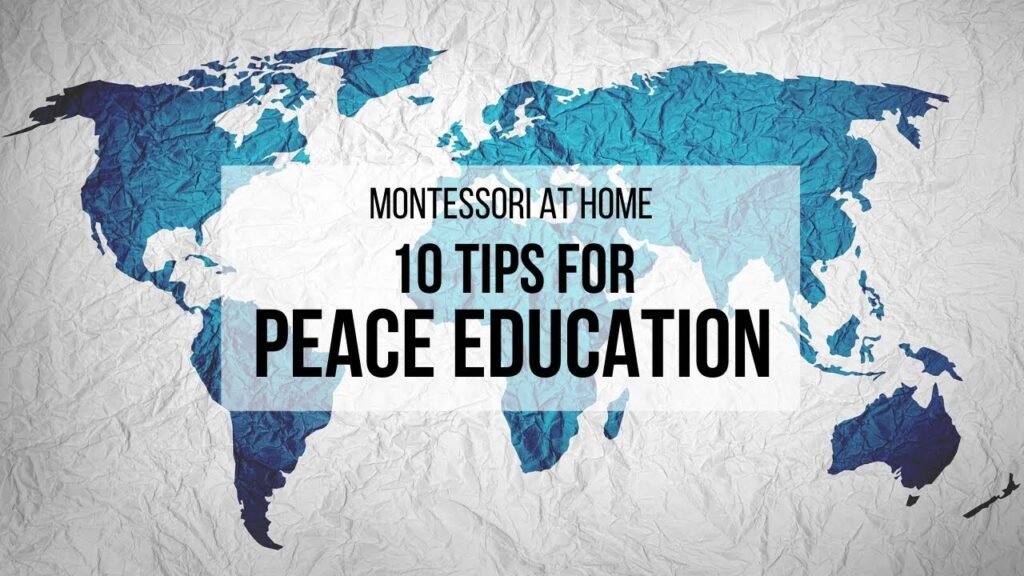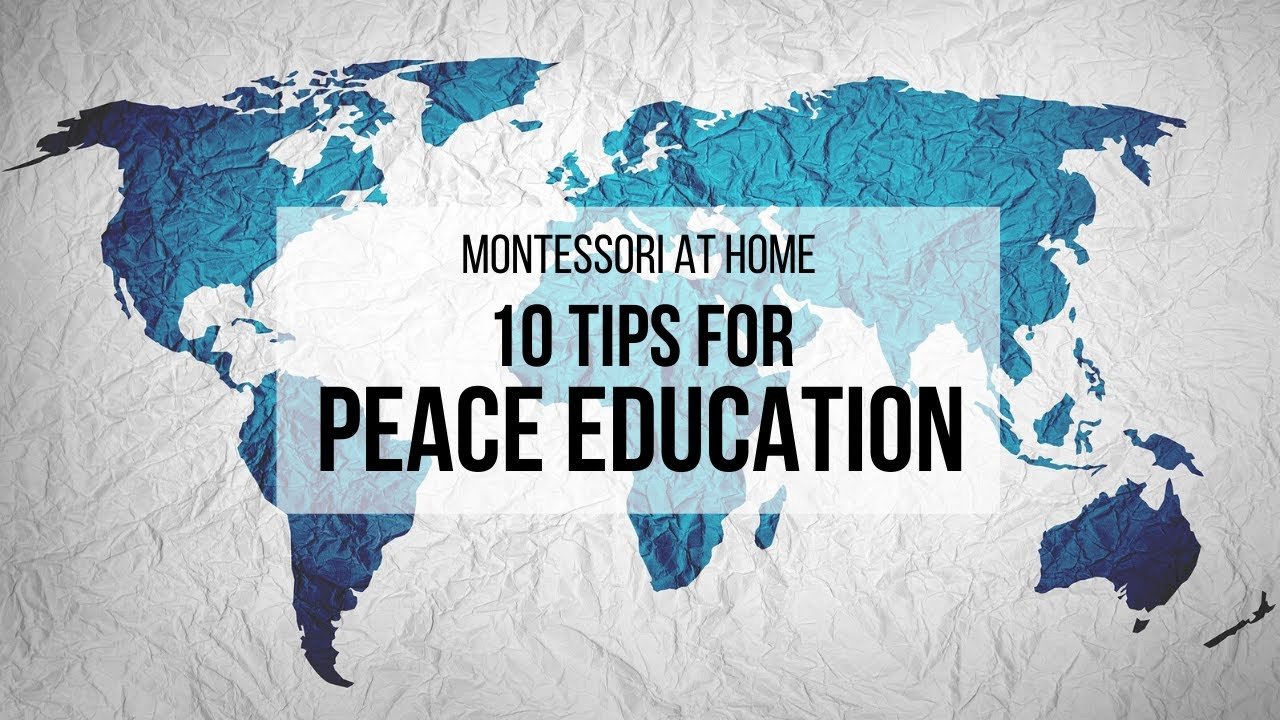Montessori education places a strong emphasis on peace education as a fundamental component. Children are taught respect for the environment, materials, and others, as well as grace and courtesy lessons to navigate social interactions harmoniously. Parents are encouraged to incorporate peace education at home by fostering pride in identity, heritage, and culture, as well as teaching conflict resolution skills and simple acts of kindness. By modeling positive behavior and using positive discipline strategies, children develop crucial social skills that emphasize cooperation over competition.
The Montessori approach to education also highlights the importance of introducing languages at a young age and avoiding reinforcing stereotypes. Parents can engage children in caring for the environment and others, select diverse books and toys to promote cultural awareness, and encourage global penpals to connect with different cultures. By following these tips for peace education at home, parents can help children develop a sense of pride in themselves and cultivate a harmonious and respectful environment for their children to thrive.
Importance of Peace Education in Montessori Education
Peace education as a key component in Montessori education
In Montessori education, peace education is considered a fundamental aspect of a child’s development. Dr. Montessori believed that through peace education, children could learn to live harmoniously with others and establish a sense of global citizenship. This foundational principle is integrated into every aspect of the Montessori curriculum, emphasizing the importance of fostering a peaceful and respectful environment for all individuals involved.
Integration of peace education in the Montessori classroom environment
Peace education goes beyond traditional classroom instruction; it is infused in the very fabric of the Montessori classroom environment. Children are taught to respect their surroundings, care for materials, and show consideration for one another. By actively engaging in lessons that promote peace, children learn valuable skills that help them navigate social interactions with grace and courtesy.
Teaching respect for the environment, materials, and others
One of the core components of peace education in Montessori is instilling a deep respect for the environment, materials, and others. Children are encouraged to treat their learning materials with care, respect the classroom space, and show consideration for their peers. By fostering respect and empathy, children develop a strong foundation for ethical behavior and positive social interactions.
Promoting Social Harmony in Montessori Education
Grace and courtesy lessons for harmonious social interactions
In Montessori education, grace and courtesy lessons play a crucial role in promoting harmonious social interactions. These lessons teach children essential skills such as conflict resolution, kindness, and polite communication. By incorporating these teachings into daily interactions, children learn to navigate social situations with respect and consideration for others.
Encouraging cooperation over competition
Montessori education emphasizes the value of cooperation over competition in fostering social harmony. By promoting a spirit of collaboration and teamwork, children learn to work together towards shared goals. This approach helps children develop strong interpersonal skills and a sense of community that transcends individual achievement.
Avoiding reinforcement of stereotypes in words and actions
In Montessori education, it is essential to avoid reinforcing stereotypes in both words and actions. By modeling inclusive behaviors and language, educators help children develop a deep respect for diversity and acceptance. Through conscious efforts to challenge stereotypes, children learn to appreciate the uniqueness of individuals and foster a culture of inclusion.

Implementing Peace Education at Home
Fostering pride in identity, heritage, and culture
Parents play a vital role in implementing peace education at home by fostering pride in their child’s identity, heritage, and culture. By celebrating diversity and teaching children to embrace their roots, parents instill a sense of self-worth and respect for others. This foundational understanding promotes unity and acceptance within the family unit.
Teaching conflict resolution skills and acts of kindness
At home, parents can teach children valuable conflict resolution skills and promote acts of kindness towards others. By modeling positive behavior and encouraging empathy, children learn to navigate disagreements peacefully and engage in acts of compassion. These lessons lay the groundwork for building strong relationships based on mutual respect and understanding.
Modeling positive behavior and using positive discipline strategies
Parents play a crucial role in modeling positive behavior and implementing positive discipline strategies at home. By setting a good example and providing consistent guidance, parents create a nurturing environment where children feel safe to express their emotions and learn from their mistakes. Positive discipline strategies focus on teaching children appropriate ways to manage their behavior while fostering a sense of accountability and responsibility.
Language Development in Montessori Education
Encouraging bilingualism and multilingualism
Montessori education places a strong emphasis on encouraging bilingualism and multilingualism in children. By introducing languages at a young age and providing opportunities for language exposure, children develop valuable linguistic skills that enhance their cognitive development. Bilingualism promotes cultural awareness and opens doors to intercultural communication, fostering a deep appreciation for diverse languages and cultures.
Introducing languages at a young age
In Montessori education, introducing languages at a young age is essential for maximizing language acquisition and cognitive development. Children have a remarkable ability to absorb new languages during the critical period of early childhood. By exposing children to diverse languages through engaging activities and materials, educators promote language proficiency and cultural understanding from a young age.
Selecting diverse books and toys to promote cultural awareness
Montessori educators strive to select diverse books and toys that promote cultural awareness and acceptance. By providing children with a rich variety of resources that reflect different cultures and perspectives, educators foster an inclusive learning environment that celebrates diversity. Through exposure to diverse literature and toys, children develop empathy, understanding, and respect for individuals from diverse backgrounds.
Teaching Grace and Courtesy in Montessori Education
On-the-spot lessons and role-playing for grace and courtesy
In Montessori education, on-the-spot lessons and role-playing exercises are used to teach children grace and courtesy. By practicing real-life scenarios and social interactions, children learn essential skills such as conflict resolution, politeness, and respect. These interactive experiences help children internalize key social behaviors and navigate social situations with confidence and empathy.
Using a “peace flower” object for conflict resolution
One innovative approach to conflict resolution in Montessori education involves using a “peace flower” object. Children engage in a structured process where they take turns holding the peace flower and expressing their feelings calmly and respectfully. This tool promotes effective communication, active listening, and peaceful conflict resolution among children, helping them build strong interpersonal skills and emotional intelligence.
Engaging children in caring for the environment and others
Montessori educators encourage children to care for the environment and show kindness towards others as part of grace and courtesy lessons. By involving children in practical activities such as gardening, recycling, and community service, educators instill a sense of responsibility and compassion. These hands-on experiences foster empathy, respect for nature, and a deep understanding of interconnectedness, nurturing children’s capacity for compassion and respect.
Cultivating Compassion and Respect in Children
Developing a sense of pride in oneself through peace education at home
Peace education at home plays a crucial role in cultivating a child’s sense of pride in themselves. By fostering positive self-esteem, teaching empathy, and promoting values of kindness, parents nurture children’s inner strength and resilience. This holistic approach to peace education empowers children to embrace their unique identities, build positive relationships, and contribute to a more harmonious society.
Encouraging global penpals for connecting with diverse cultures
A valuable way to promote compassion and respect in children is by encouraging global penpals. Through letter exchanges with peers from different cultures and countries, children gain insights into diverse perspectives, traditions, and worldviews. This intercultural communication fosters empathy, friendship, and understanding, creating opportunities for children to connect with others on a global scale and develop a broader sense of empathy and respect for cultural diversity.
Having open and honest conversations about peace, kindness, and diversity
Parents can promote compassion and respect in children by engaging in open and honest conversations about peace, kindness, and diversity. By discussing these essential topics with children in a safe and supportive environment, parents cultivate critical thinking, empathy, and a strong moral compass. These conversations help children develop an appreciation for social justice, inclusivity, and respect for all individuals, nurturing a sense of compassion and a commitment to creating a more equitable and harmonious world.

